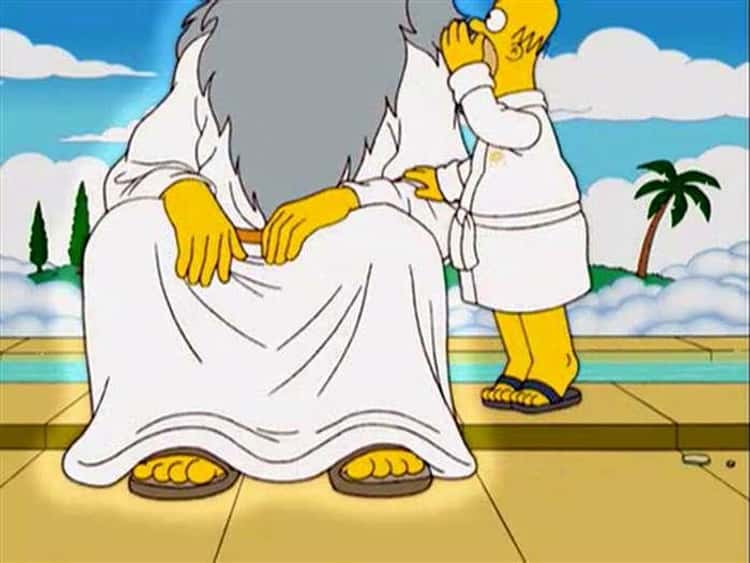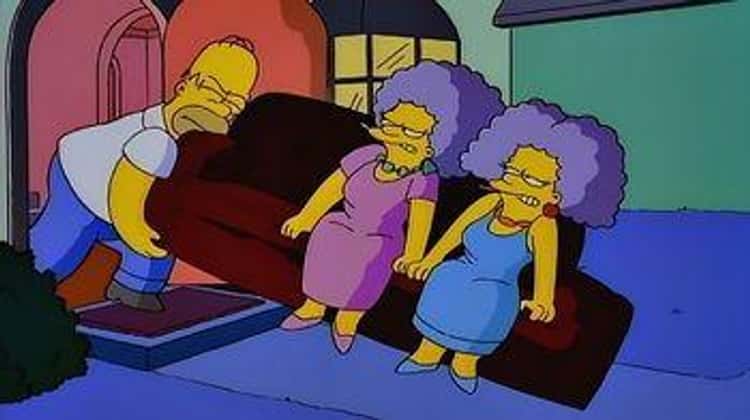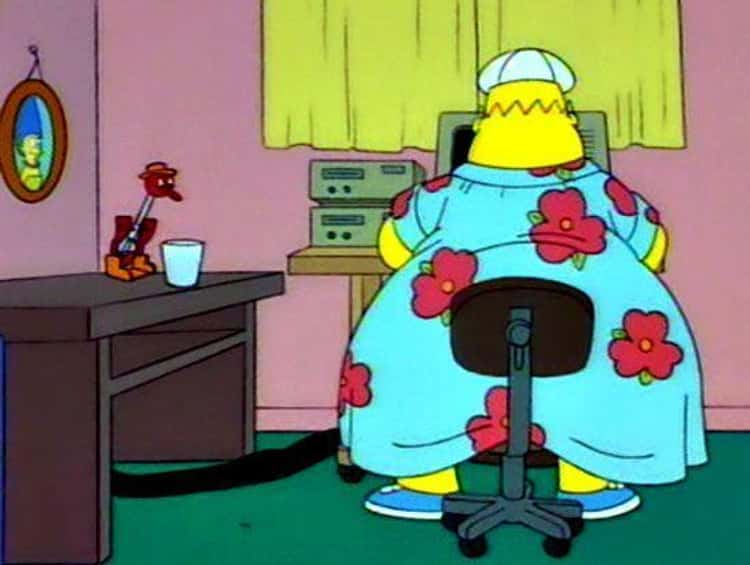Homer is often perceived as a simpleton with a penchant for donuts, Duff beer, and television. However, despite these surface-level traits, true Simpsons aficionados know Homer Simpson is actually a much more complex character who shows true emotional depth on a somewhat regular basis. Because of this, hardcore fans of The Simpsons are able to create their own fan theories about Homer that make so much sense they might as well be cannon.
Based on Ranker’s list, these brilliant Homer Simpson fan theories are ordered so that the most agreed upon theory is #1. Over 8,000 Simpsons fans have voted so far!
9. Homer Has Been in a Coma Since 1993

In “So It’s Come To This: A Simpsons Clip Show” (S4E18), Bart’s April Fool’s Day prank goes a little bit further than intended, landing Homer in a coma. For us viewers, it’s a fun device to support watching highlights from the first few seasons in Homer’s dreamscape. And, in the end, Homer wakes up and immediately returns to his most consistent impulse: strangling Bart. But if you ask Redditor /u/Hardtopickaname, that’s not the actual ending. Or, in a way, it is.
According to this theory, Homer never woke up. He remains in a coma forever, and everything we’ve seen from April 1993 onward is some combination of Homer’s memory, imagination, and things manifested based on absorbing information from his hospital room. To support this theory, the Redditor points out a couple things.
For one, once the series gets past “Clip Show,” the plot lines start to get really zany. Where up to this point there were plenty of story arcs akin to Lisa has a crush on her teacher, the post-coma Simpsons do things like travel to outer space and hunt the Loch Ness monster. These are Homer’s fever dreams, not actual events. Secondly, it’s feasible that Homer is able to conjure stories about people and cultural events that only exist post-1993 because, as an example, a Lady Gaga song could come on the radio in his room. Now Lady Gaga is in our episode, and in all likelihood her form is more heightened and over-the-top than in real life (which is a recurring trope of celebrity guest stars on the show).
/u/Hardtopickaname concludes this theory by pointing out that even if all the misadventures of the The Simpsons are simply the wildly firing neurons in Homer’s thick skull, the beauty is that he’s still doing what he was always meant to do: entertain us.
8. Homer Knows He’s a Cartoon

Does he now, Redditor /u/raysofdavies4? Well if Homer knows he’s a cartoon, then how did he find out? Did he ask Matt Groening? Did he tune into the Sunday night block of animated shows on Fox and see himself on screen?
Well, as the Redditor will tell us, Homer got the news from God himself. In “Homer the Heretic” (S4E3), our lazy antihero makes the sacrilegious choice to stop attending church. While he ultimately learns a valuable lesson about different faiths coming together for a common good, the real takeaway from “Heretic” is that in the closing moments, Homer asks God what the meaning of life is. God’s answer, at least according to this theory, is that (paraphrasing, of course), “There is no meaning; you’re just a cartoon.” With this knowledge, Homer is armed in future seasons with a sense of near-invincibility. He can try anything. Throw himself at danger. Switch careers. Waste money. Get wasted at Moe’s. None of it really matters, for he is nothing more than a cartoon.
A pretty grim theory, but we’re not here to argue with the divine plans of the d’oh-mega.
7. Homer Chooses To Be Stupid

It’s common knowledge that Lisa is the egghead of the family. Her acumen at everything soars high above her immediate family members, especially her father. But if you ask Redditor /u/kerbyklok, the notion that “ignorance is bliss” might be more more proactive than genetic.
We know from “HOMЯ” (S12E9) that Homer would actually be a highly, highly intelligent man if not for a crayon that’s been lodged in his brain since childhood (and then re-lodged by unlicensed physician Moe later on). When not hindered by a wax coloring stick, Homer’s IQ actually goes up 50 points. The crayon logic tracks within the episode, but it begins draw questions when you think about the supposed ‘Simpson Gene’ from “Lisa the Simpson” (S9E17), which suggests that the Simpson men (but not the women) get gradually dumber as they age. But if this were true, then how could Homer regain his intelligence when the crayon is removed from his noggin? To that end, if Simpson men can be smart, then what’s going on with the dimwitted (often clever, but let’s face it, ultimately dumb) Bart? The answer: willful ignorance. Homer and his son know that life is better if you’re dumb and happy, rather than smart and constantly reeling. Maybe Homer didn’t actually need the crayon removed, but when it was he simply used it as an excuse to moonlight as his true, intelligent self for a bit. Experiencing the social strain of mental superiority confirmed what he already knew: his life is more comfortable in his regular, knuckle headed persona.
Is Homer just dumb? Probably. But if he isn’t, he’d never let you know.
6. Bart Became A Stone Cutter Before Homer

In “Homer the Great” (S6E12), Homer is introduced to the fraternal order of the Stonecutters. After being initiated because his father, Abe Simpson, is a legacy member, Homer is quickly shunned and dismissed when he accidentally destroys their Hallowed Sacred Parchment. However, a birthmark on his behind signifies that he is actually the Chosen One, leading to a brief reign as their leader. But was Homer the first living under the Simpson roof to be a Stonecutter? Redditor /u/TyPiper93 says no, it was actually Bart.
Several clues throughout the episodes support this theory, even if they are somewhat far-reaching. For example, Bart has a sarcastic, yet cagey response to Homer’s assertion that Lenny and Karl are getting special treatment at work. What does he know that he’s not telling? The really interesting elements of the theory, though, come by looking farther back.
Beyond being the son of a Stonecutter, the only other way to become one is a to save the life of a Stonecutter. Well, in Season 2’s “Blood Feud,” Bart does just that by donating blood to Mr. Burns. The Redditor also points out that despite getting slapped on the wrist a decent amount at school for his endless bad behavior, Bart never faces an series consequences, like expulsion. Could this be because Principal Skinner is also a Stonecutter?
5. Homer is a Billionaire Sports Team Owner

This one isn’t so much a theory as it is a simple truth, but to what extent it actually impacts the Simpsons livlihood is the question. As pointed out by Redditor /u/awkwardhipsters, in “You Only Move Twice” (S8E2), Homer is given the the 1996 Denver Broncos by Hank Scorpio (voiced by Albert Brooks), Homer’s new boss who turns out to be a supervillain. This explains how the Simpson clan is able to continually do so many strange, expensive, distant, time-removed-from-“work” (the power plant) activities and adventures.
Simply put: NFL teams generate millions and millions of dollars in annual income, and Homer has a cash cow (or horses, perhaps) in the Mile High City. Heck, two years after he acquired the team from Scorpio they won two Super Bowls, making them one of the most popular and profitable teams at the time! So there you have it. As long as you own a professional sports franchise, you’ll never work a day in your life.
4. Mr. Burns Knows Homer’s Name

In Who Shot Mr. Burns? – the two-part, season-spanning Dallas sendup – almost everyone is a suspect in the titular central question. While this is true, there is no one with a more crazed, vocal grievance than Homer, who loses it because Mr. Burns cannot remember his name. This trope plays out time and time again over the course of the series, to the extent that it seems almost impossible that the geriatric power plant owner could have such a poor memory. So, what if it’s intentional?
As speculated by Redditor /u/MCmnbvgyuio, that just might be the case. As the user points out, in “Two Cars in Every Garage and Three Eyes on Every Fish” (S2E4), after Homer ruins Mr. Burns’ election campaign, Burns remarks, “Simpson, I shall make it the focus of my remaining years that your dreams will go unfulfilled.” Normally, ol’ Montgomery lashes out with violent outbursts or threats of “thrashings,” but here he delivers a much more sinister decree. Could it be that from this point forward Mr. Burns decided to gaslight Homer into thinking he can’t remember his name? By making his lowly nuclear technician seem so insignificant that even something as simple as his name is forgettable, Mr. Burns could be playing a long game of psychological warfare.
3. Patty & Selma Hate Homer Because They Blame Themselves

It’s no secret that Marge’s sisters Patty and Selma aren’t big fans of Homer. The identical duo has a tendency to forego normal greetings like, “Hi there,” with comments like, “Did it just get fatter in here?” But what exactly is it about Homer that they despise so fervently? Redditor /u/Bteatesthighlander1 theorizes that it’s less about Homer and more about themselves.
From a very young age, Patty and Selma were verbally abusive, controlling, and cruel to poor little Marge. Lording over her, Marge developed characteristics that made her the perfect fit for a man like Homer. As the Redditor puts it, the combination of love of housework, tolerance, and validation are the key ingredients, and they were all instilled by her sisters. Patty and Selma recognize this and hate themselves for it, so they try to turn Marge around the only way they know how: insulting Homer.
2. Homer’s Drinking Bird Didn’t Just Fall Over

You thought “Who Shot Mr. Burns?” had mystery and intrigue, huh? Well get in the hot seat (remotely, from home) for this one from Redditor /u/motherstep! In “King-Size Homer” (S7E7), Homer puts on an exorbitant amount of weight in order to “gain” disability status, allowing him to work from home. Once donning a moomoo and fat man’s cap, Homer simply has to repeatedly push a single button from his in-home safety regulating station. Still too lazy to perform this simple task, he recruits a drinking bird toy to do the work for him. While leaving his new employee unsupervised so he can attend a movie, something goes awry and the drinking bird falls over, leaving the entire town of Springfield in danger of a nuclear meltdown. Ultimately Homer is able to save the day by plugging the containment chamber with his corpulent form, but the question remains, how did the bird tip over?
The Redditor theorist here dismisses most of the prime suspects– Bart is too supportive; Lisa would fear becoming an environmental terrorist; Santa’s Little Helper is too destructive for such a small act– leaving one motivated bird-tipper: Marge! Throughout the episode, Marge argues that Homer is taking a big risk and even says that she feels less attracted to him. Not fully understanding the ramifications of messing with the reactor’s safety and simply wanting to make a point to her husband, Marge took the drinking bird off the clock.
1. Mr. Burns Wants Homer To Do A Bad Job

From the opening credit sequence to the numerous, almost uncountable instances seen throughout our decades in Springfield, the power plant is a wreck. Nuclear waste pools on the ground. Walls and ceilings collapse. Hard hats and protective gear seem optional, at best. And all of this falls squarely on the slouched, snoozing shoulders of Homer. But why is this? If you ask Redditor /u/All_of_it_is_one, it’s by design, held in place by Charles Montgomery Burns. This theory suggests that Mr. Burns actually wants a totally incompetent nuclear safety inspector. Having the lowest standards imaginable at the plant both saves money and protects Burns from scrutiny. A more knowledgeable employee in Homer’s position (or a more knowledgeable Homer; see “Homer Chooses To Be Stupid”) would surely report the potentially disastrous issues at the plant to Burns, or perhaps even to a higher authority. But not Homer. To Burns, he is the model employee.
